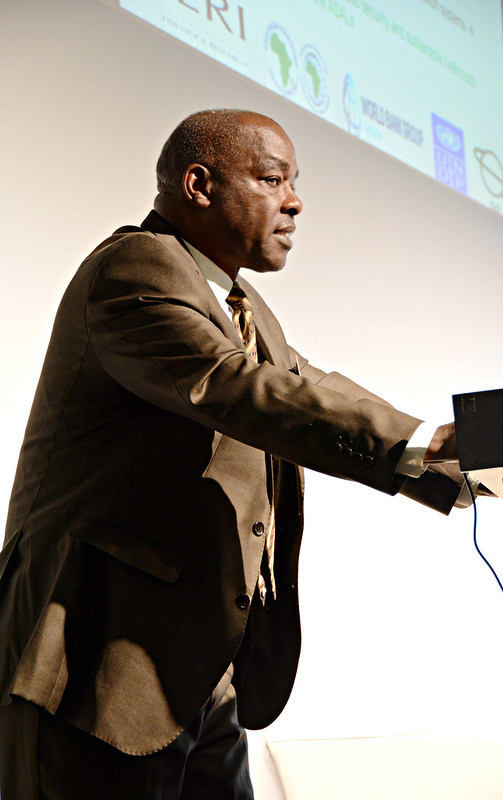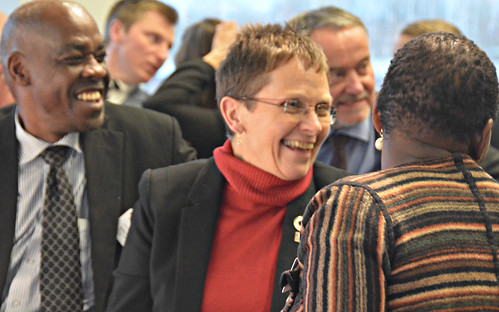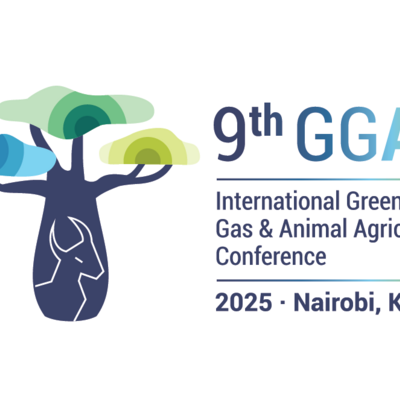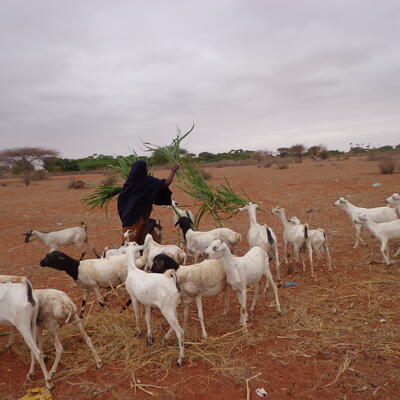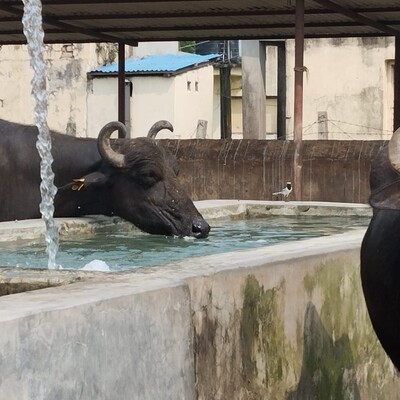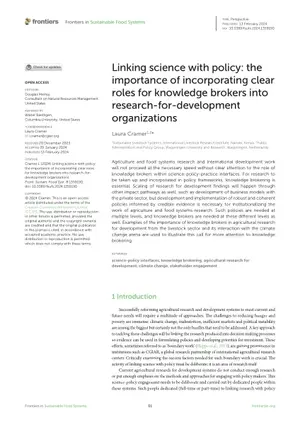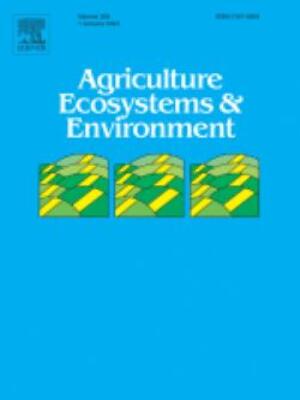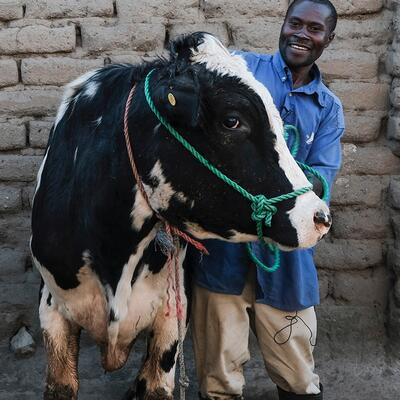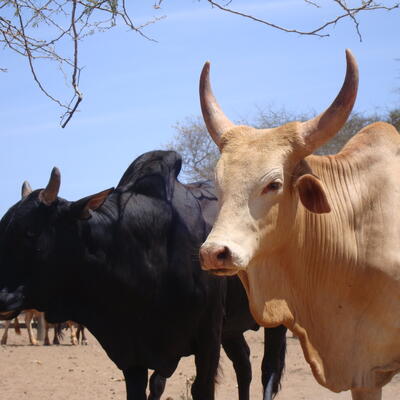
Kenya’s Robin Mbae on livestock and climate change at Berlin’s Global Forum for Food and Agriculture
Robin Mbae, deputy director of livestock production at the Kenya Ministry of Agriculture, Livestock and Fisheries, presenting at the Global Forum for Food and Agriculture (photo credit: ILRI/Susan MacMillan).
On 19 Jan 2018, one of ten expert panel discussions at the Global Forum for Food and Agriculture (GFFA) was held on Sustainable solutions to the livestock sector: The time is ripe! This two-hour session was organized jointly by the German Federal Ministry for Economic Cooperation and Development (BMZ), the German Corporation for International Cooperation (GIZ), the International Livestock Research Institute (ILRI), the Global Agenda for Sustainable Livestock (GASL) and the Livestock Global Alliance (LGA).
This session was moderated by ILRI Assistant Director General Shirley Tarawali. Following a welcome by ILRI Director General Jimmy Smith, Stefan Schmitz, head of BMZ’s division of rural development and food security and commissioner for BMZ’s special initiative on One World–No Hunger, gave an opening speech.
Fritz Schneider, chair of the Global Agenda for Sustainable Livestock (GASL), then gave a short overview of livestock and the UN’s Sustainable Development Goals.
The first of the next three 10-minute presentations, on climate change, was made by Robin Mbae, deputy director of livestock production at the Kenya Ministry of Agriculture, Livestock and Fisheries. Mbae plays a central role in Kenya’s planning and implementation of interventions to address the impacts of climate change on the livestock sector and vice versa.
The impacts of climate change on Kenya are significant, Mbae reported, particularly for animal husbandry and agriculture because Kenya relies on rainfall for its main source of agricultural water rather than on irrigation.
He said the Kenya government is committed to meeting its global climate change commitments and has developed a series of policy documents to guide the country in moving towards more sustainable livestock systems.

‘The map above portrays the large arid (dark orange) and semi-arid (light orange) areas of Kenya, comprising 80% of the country, where livestock keeping and meat production are major socio-economic activities, and the country’s high rainfall areas (white), where dairy production is important.

‘As you can see in the above slide, emissions of greenhouse gases in Kenya are projected increase to 2030 across all sectors, with limited options for agriculture to reduce its emissions but many options are available for reducing emissions generated by the livestock sector.

‘Here are listed some of the policies and initiatives that Kenya has developed both to reduce its emissions of greenhouse gases and to help the country adapt to climate change.
‘As Kenya has two layers of government, the national government and 47 county governments, we have analysed climate change profiles at the county level to assess local trends, identify local vulnerabilities and come up with local responses potentially able to help communities adapt to, and cope with, climate change. The Kenya government is also setting a transformative agenda for dairy largely by helping the dairy sub-sector move to more intensive production. And the Kenya government has introduced agricultural insurance and subsidy schemes and is offering incentives to farmers and herders in the form of schemes that give them payments for their ‘ecosystem services’ which can forestall further environmental degradation.

‘And here are some of the livestock-specific projects and interventions that address climate change challenges in Kenya. For example, KLIP—the Kenya Livestock Insurance Project—is being carried out by the Kenya government with the support of ILRI to help cushion livestock herders from the impacts of severe droughts, which have been increasing in frequency and severity in recent years.’
View Robin Mbae’s whole presentation:
Check back here for highlights of the next two short presentations at this expert panel session of the GFFA.
View ILRI images of the GFFA here and GFFA images here.
Watch a 3-minute animated video produced by Germany’s Federal Ministry of Food and Agriculture to kick off the GFFA.
Kenyan climate change expert Robin Mbae and Shirley Tarawali, ILRI’s assistant director general, share a light moment at the Jan 2018 Global Forum for Food and Agriculture, in Berlin (photo credit: ILRI/Susan MacMillan).
Read news clippings about the GFFA
GASL’s Fritz Schneider on livestock and the SDGs at Berlin’s Global Forum for Food and Agriculture
ILRI News blog, 6 Mar 2018
Fritz Schneider, chair of the Global Agenda for Sustainable Livestock (GASL), gave a short overview of livestock and the UN’s Sustainable Development Goals.
BMZ’s Stefan Schmitz on sustainable solutions for the livestock sector
ILRI News blog, 5 Mar 2018
Following a welcome by ILRI Director General Jimmy Smith, Stefan Schmidt, head of BMZ’s division of rural development and food security and commissioner for BMZ’s special initiative on One World–No Hunger, launched in 2014, gave an opening speech.
Towards a sustainable, responsible and efficient livestock sector—Jimmy Smith at the Berlin Global Forum for Food and Agriculture
ILRI News blog, 22 Feb 2018
A delegation from ILRI was involved in several of this year’s GFFA events, including the following the ‘Kick-off’ event on 18 Jan 2018, with ILRI Director General Jimmy Smith serving on the panel. Smith made the following main points in the panel discussion. ‘Although the solutions and trajectories for shifting to a more sustainable, responsible and efficient livestock future look very different, and will have very different starting points, depending on the local economy and environment, the kind of livestock raised and the system used to produce the animals, the overall aims of livestock stakeholders worldwide are similar if not the same—to produce food-producing animals in win-win-win ways that are sustainable, responsible and efficient.
Livestock are taking the limelight in global policymaking fora
ILRI News blog, 21 Feb 2018
Recognition of the importance of livestock in addressing some of the world’s greatest challenges, including meeting the United Nations’ 17 Sustainable Development Goals, has been rising sharply in recent years among leading national, political, donor and international bodies. ILRI works with many of these organizations to help ensure that the world’s many diverse livestock systems evolve in ways that are efficient, profitable, sustainable and equitable.
Animal health and welfare, two cornerstones of sustainable, responsible and effective food production
ILRI News blog, 9 Feb 2018
Monique Eliot, director general of the OIE, leads a high-level panel discussion at the Global Forum for Food and Agriculture, in Berlin, 19 Jan 2018. Improved animal health and welfare standards do more than improve animal health and welfare, as important as those are. Applying such standards can increase food production in ways that also protect the environment and enhance the resilience of livestock producers and systems.
Animal protein virtually irreplaceable part of ‘children, young & elderly diet’: DG, FAO
Business World (India) 25 Jan 2018
The world population is expected to reach 9.7 billion by 2050 and 11.2 billion by 2100, according to a report. As a result of this growing population, consumer behaviour will also change. Now, more and more people live in cities, which unfolds more challenges in farming for middle-class people.
GFFA discusses the future of animal husbandry
The Pig Site, 24 Jan 2018
A delegation from the Ministry of Agribusiness, led by Luis Miguel Etchevehere, actively participated in the Global Forum for Food and Agriculture (GFFA). On this occasion, the German Presidency proposed as a topic of discussion, “Shaping the future of livestock in a responsible and efficient sustainable way”.
Agricultural ministers call for action on sustainable livestock production for SDG implementation
International Institute for Sustainable Development, 23 Jan 2018
20 January 2018: Agricultural Ministers and representatives of international organizations participating in the tenth Global Forum for Food and Agriculture (GFFA) stressed the need for action towards more sustainable, responsible and efficient livestock production and animal husbandry to address global challenges, including SDG 2 (Zero Hunger); SDG 3 (Good Health and Well-being); and SDG 13 (Climate Action).
Agrarminister der Welt beschließen Umbau der Tierhaltung bis 2030
Top Agrar magazine (Germany), 22 Jan 2018
Über Lösungen, wie die Tierhaltung produktiver, gleichzeitig aber umweltschonender und mit mehr Tierwohl werden kann, diskutierten vergangene Woche über 2.000 Vertreter aus Politik und Wirtschaft, Wissenschaft und Zivilgesellschaft in zehn Fachpodien, zwei Ministertreffen und einem Wirtschaftspodium auf dem 10. Global Forum for Food and Agriculture (GFFA) in Berlin. In der Auftaktveranstaltung erinnerte der Generaldirektor des International…
Grüne Woche 2018: Abschluss 10. Global Forum for Food and Agriculture: Mit nachhaltiger Tierhaltung die Welternährung sichern (FOTO)
Finanzen (Germany), 21 Jan 2018
Querverweis: Bildmaterial ist abrufbar unter http://www.presseportal.de/bilder—Im Jahr 2050 werden auf der Erde zehn Milliarden Menschen leben. Mit dem Wachstum verändern sich auch die Konsumgewohnheiten. Immer mehr Menschen leben in Städten und eine wachsende Mittelschicht sorgt dafür, dass die Nachfrage nach Fleisch, Milch und Eiern rasant steigt. Wie kann es gelingen, die Tierhaltung…
Food is Political! 33,000 tell the world they are fed up with agri-industry
ARC2020 (Europe), 20 Jan 2018
33,000 citizens—including 160 tractor driving farmers—made their way through the winter streets of Berlin on Saturday to tell the world—food is political!
Sustainable livestock futures—BMZ, GIZ and ILRI at the Global Forum for Food and Agriculture this week
ILRI News blog, 15 Jan 2018
For several days this week (18–20 Jan 2018), several scientific directors and staff of the International Livestock Research Institute (ILRI)—Jimmy Smith, Shirley Tarawali, Dieter Schillinger, Lutz Merbold and Kristina Roesel—will be participating with several ILRI partners in the Global Forum for Food and Agriculture (GFFA), held in Berlin, Germany.
Thinking ‘beyond the farm’—On Germany’s longstanding commitment to agricultural research for development
ILRI Clippings blog, 30 Nov 2017.
Stefan Schmitz delivers a short (6-minute) filmed presentation at one of several linked collaborative events, titled ‘Agriculture Advantage: The Case for Climate Action in Agriculture’, led by the CGIAR Research Program on Climate Change, Agriculture and Food Security (CCAFS) and held on the sidelines of the 23rd Session of the Conference of the Parties (COP23) to the United Nations Framework Convention on Climate Change (UNFCCC) on 7 Nov 2017 in Bonn, Germany.






